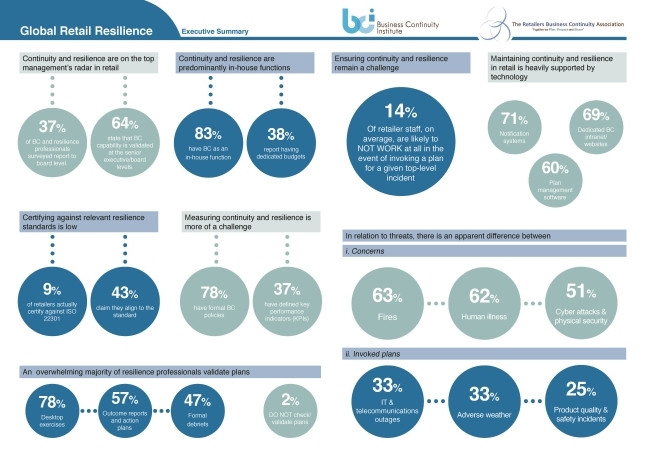Johannesburg, 13 Nov 2015
More than one in five retail organisations do not have a formal business continuity policy in place. That is according to a report published today by the Business Continuity Institute and supported by the Retail Business Continuity Association.
The Retail Resilience Report also highlighted that, of those that do have a policy in place, less than half have key performance indicators attached, making it difficult to assess whether the policy is effective. With retailers being at the front-line of modern society where sales can be made or lost in an instant, it is perhaps more important for retailers to have plans in place to manage disruption.
Some of the other findings in the report include:
* Less than one in 10 respondents (9%) claimed their organisation was certified to ISO22301, the international standard for business continuity management, although 43% claimed to align to it.
* Nearly a quarter of respondents (22%) stated they had not conducted a formal Business Impact Analysis, a fundamental part of business continuity management as it provides the data from which appropriate continuity strategies can be developed.
* Nearly one in 10 respondents (9%) admitted their organisation did not have a formal IT disaster recovery plan, while 12% claimed it was still in development.
* Fires are the number one concern for organisations (63%), closely followed by human illness (62%), cyber attacks (51%) and physical security (51%). Sixteen percent, 9%, 12% and 9% of respondents claim to have invoked their business continuity plans due to these threats materialising.
The report underscores the need to get continuity and resilience at the heart of the agenda for retailers, yet there are existing challenges in communicating the value proposition of resilience. There is a need to promote metrics that allow top management to sense the urgency of driving resilience within their organisations.
Patrick Alcantara DBCI, Senior Research Associate at the Business Continuity Institute and author of the report, commented: "The BCI acknowledges the RBCA's efforts in building resilience across the retail industry through this pioneering study. We believe that it is important for BC and resilience practitioners across different sectors to obtain relevant, industry-specific data that benchmarks their performance and adds value to their practice. This report is an excellent contribution to the retail industry and we encourage other sectors to follow suit."
John Frost MBCI, Head of Business Continuity at Marks and Spencer and Chairman of the RBCA, commented: "The RBCA have been overwhelmed by the number of retailers from across the world that chose to take part in this survey. The results have given retail business continuity and resilience professionals the ability to benchmark their activities against their peer group for the first time. This visibility will assist with those all-important conversations with top management by offering credible evidence and industry comparisons. We would like to thank the BCI for providing their expertise and support for this first survey of its kind, and of course, all those who took part. We look forward to developing and improving the survey in the future with the BCI, and supporting our fellow professionals from around the world in developing their retail resilience capability."
Retail organisations depend heavily on technology in building resilience. This may introduce considerable risks and points of failure. Retail business continuity professionals must be aware of this in implementing an agile, holistic and responsive programme life cycle. Developing relevant competencies within the team is imperative given an evolving retail industry landscape. Retail professionals understand how agility is a competitive advantage in an industry considerably influenced by market trends, rapidly changing tastes and fickle consumer behaviour. Building resilience therefore requires building skills sets among professionals in the 'protective disciplines' such as BC that enable them to respond to this context.

Share